Resources for Researchers Working with Indigenous Peoples
The No Longer on My Own (NOLOMO) project is funded by Women and Gender Equality Canada and the Nova Scotia Advisory Council on the Status of Women.
Links provided below will take you to an external website or document. We do not endorse these websites or documents and are not responsible for their contents.
My Parents, My Grandparents Went Through Residential School, and All this Abuse has Come From it: Examining Intimate Partner Violence Against Canadian Indigenous Women in the Context of Colonialism
Author(s): Cindy Ogden, Leslie M Tutty
Source: Journal of Interpersonal Violence
This secondary mixed-methods analysis explored the experiences of 40 Indigenous women from the Canadian prairie provinces who were abused by their intimate partners.
Indigenous Communities and Family Violence: Changing the Conversation
Author(s): Cindy Holmes and Sarah Hunt
Source: National Collaborating Centre for Aboriginal Health
This report provides an overview of 15 years (2000-2015) of Canadian literature on the topic of Indigenous family violence.
Violent victimization and perceptions of safety: Experiences of First Nations, Métis and Inuit women in Canada
Author(s): Loanna Heidinger
Source: Canadian Centre for Justice and Community Safety Statistics
This Juristat article will present the most current self-reported data on the lifetime (since age 15) prevalence of violent victimization, as well as the prevalence of violent victimization in the past 12 months (as of April 2022), of Indigenous women in Canada.
The Road to Safety
Source: BC Association of Native Friendship Centres
This report overviews the effects of COVID-19 on intimate partner violence in Indigenous communities. It explores the extent to which the pressures placed by the pandemic were related to Indigenous women and gender diverse people experiencing an increase in the frequency and severity of intimate partner violence, and, further, that COVID-19 related restrictions and public health measures correlated with an increase in difficulties with accessing antiviolence supports and services.
The Road to Safety
Source: BC Association of Native Friendship Centres
This report overviews the effects of COVID-19 on intimate partner violence in Indigenous communities. It explores the extent to which the pressures placed by the pandemic were related to Indigenous women and gender diverse people experiencing an increase in the frequency and severity of intimate partner violence, and, further, that COVID-19 related restrictions and public health measures correlated with an increase in difficulties with accessing antiviolence supports and services.
Addressing Mi’kmaq Family Violence
Author(s): L. Jane McMillan
Source: Tripartite Forum
This report describes a comprehensive research project focused on family violence within Mi’kmaq communities in Nova Scotia. Over five years, the research team investigated the history, nature, and responses to family violence, and the effectiveness of current services.
The Grandmothers Are With Us: Indigenous Theoretical Perspectives Towards Healing from Family Violence
Author(s): Donna Lester-Smith
Source: Journal of the Motherhood Initiative
This theoretical paper roams the landscapes of traditional, contemporary, and future Indigenous theory and healing practices, particularly, within the realm of understanding and healing from family violence. Woven throughout is meaningful text affirming that an Aboriginal worldview is different, and oftentimes necessary, from mainstream ways of healing—primarily that of wholism, whereby Aboriginal families often require healing unity.
How can community-university engagement address family violence prevention? One child at a time.
Author(s): Linda DeRiviere
Source: Aboriginal Policy Studies
This article is a case study based on the evaluations of four community-university engagement initiatives for Indigenous children, youth, and their families at a small inner-city university. It documents six principles for policy development used to engage students in their education and to begin to perceive themselves as high school and post-secondary graduates.
A Northern and Indigenous Ethical Imperative For Working With Communities
Author(s): Julie Bull
Source: University of Saskatchewan
This chapter of an Open Educational Resource explores ethical practices for research involving Indigenous communities.
An Introduction to Participatory Research Methods for Domestic Violence Programs
This webinar provides an Indigenous grassroots overview of participatory research methods. An example of a small-scale, participatory research project with a community-based service provider is illustrated during the webinar.

